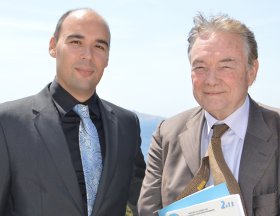The 2nd Policy Brief produced by FEMISE and The Next Society entitled "From Refugee to Restaurateur: A Syrian Entrepreneur's Path to Success in Jordan", by Marah Jamous, West Asia and North Africa Institute (WANA) presents some of the challenges facing Syrian refugees in Jordan through the eyes of a young Syrian refugee who was able to join the Jordanian job market through a joint venture with a Jordanian partner and launch a restaurant. Video report.
Summary of the brief by the author Marah Jamous, West Asia and North Africa Institute (WANA)
Ten years have passed since the Syrian conflict began, and it “remains the world’s largest refugee crisis.” After a decade of continuously welcoming Syrians to Jordan, they now represent 10% of the Jordanian population.
This makes Jordan the second largest refugee host country per capita in the world. It is believed that the participation of these refugees in the labor market can contribute positively to the Jordanian economy, this has made their inclusion necessary.
The Jordanian Compact that was introduced in 2016 was the first in the South-Med region to rightly address the occupational inclusion of Syrian refugees in host communities. Five years later, Jordan has been able to address many, but not all, of the issues addressed.
This Policy Brief produced by FEMISE and The Next Society presents some of the challenges facing Syrian refugees in Jordan through the eyes of a resilient young Syrian refugee who was able to join the Jordanian labor market through a joint venture with a Jordanian partner and start a food business.
This young refugee not only found a way to escape unemployment, which reached the highest level of 50% among youth in Jordan, but also found innovative and creative ways to use his knowledge and skills to generate his own income through his startup, despite the challenges.
This case study shows that the inclusion of refugees in the Jordanian labor market can be facilitated if the capital required to open a sole proprietorship can be reduced, access to financial services is facilitated, legislation on joint ventures is clarified, and the availability of vocational training for Syrian refugees is increased.
The Policy Brief, entitled “From Refugee to Restaurateur: A Syrian Entrepreneur’s Path to Success in Jordan,” by Marah Jamous, West Asia and North Africa Institute (WANA) can be found here
”This policy brief has been produced with the financial support of the European Union. The contents of this brief are the sole responsibility of the authors and can under no circumstances be regarded as reflecting the position of the European Union.”










Réagissez à cet article